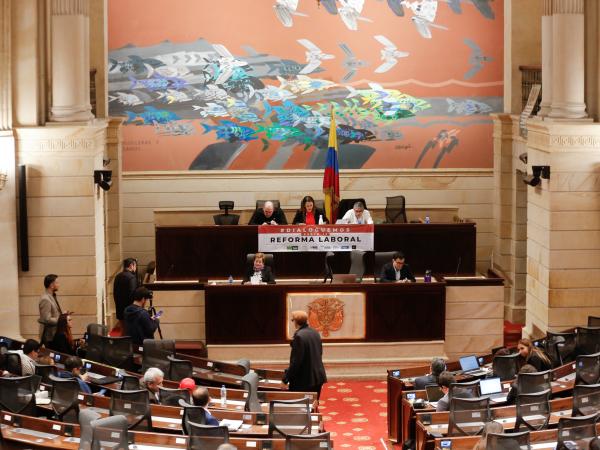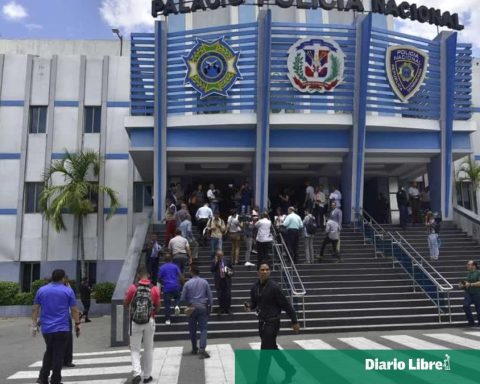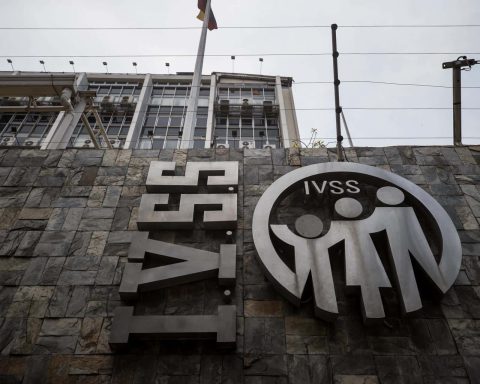In a strong debate, characterized by accusations and constant challenges, the plenary session of the House of Representatives advances in the process of labor reform, a project that has already suffered a severe setback, which was regretted by the speakers and defenders of the initiative, who denounced that the unions are lobbying during the votes.
So far, the representatives have given the green light to more than 10 of the 80 articles of the reform, which regulate matters related to indefinite-term, defined-term and work-based employment contracts, as well as modifications to the Substantive Labor Code and the jobs that are developed through of digital platforms; point that has been of vital importance for the National Government.
Also read: Public order problems have impacted the daily production of barrels of oil
Likewise, the regulations that have already been passed strengthen the surveillance and monitoring of automated systems, while it is expected that attention will now focus on the agricultural contract and the regulation of wages, salaries, guarantees for quality of life and rural training programs. for Colombian workers.
The latter has been described as a great advance in protection of labor rights, since “The worker may agree with the employer on the payment of the salary and in general of all the rights and obligations derived from the modality described here, which will be recognized in the payment periods agreed between the parts under the modality of a rural daily wage.”
Labor reform debate
Milton Díaz / EL TIEMPO
This change also establishes that “in addition to paying for ordinary daily work, it will compensate the value of all social benefits and legal benefits to which the agricultural worker is entitled, such as bonuses, aid and subsidies, not including vacations.”
hard blow
During the day this Tuesday -October 1- when there are only two sessions focused solely on the articles of the labor reform, the full session of the Chamber took an unexpected turn in which, with an unexpected majority, It overturned a pillar proposal of the project and took the Government and speakers by surprise.
This is article 8, which sought to significantly increase compensation for dismissal without just cause, improving the conditions of workers, establishing that for fixed-term contracts or for work or labor, the minimum compensation would be 30 days, in instead of the current 15 days, a change that was intended to strengthen labor protections and ensure that employees received fairer compensation upon dismissal.
For reading: Labor reform: how many and which articles have been approved so far in the Chamber
“We sank Art. 8 in the discussion of labor. The Government intended to double compensation for dismissals without just cause after the eleventh year of service. Despite the good intention, it would have generated perverse incentives, harming workers,” said representative Andrés Forero, of the Democratic Center.
In the case of indefinite-term contracts, compensation is also would increase. If the worker had less than one year of service, he would receive 45 days of salary and for those who worked more than one year and less than five, 15 days would be added for each additional year and from the fifth year, the payment would be 20 days, and after 10 years, 40 days for each year worked.

Representative of the chamber, María Fernanda Carrascal
Milton Díaz / EL TIEMPO
Although it was expected that the labor reform would be ready to begin its journey in the Senate next week, it appears that its processing will take a little longer in the House of Representatives, where the challenges against the president of this legislative chamber, Jaime Raúl Salamanca, They are delaying the vote on the articles and it is increasingly less possible that everything that is missing will be filled in the remaining plenary sessions.
Sectors hit
The labor reform debate is advancing at a time when it was known a report from the firm Dapper that warns that the brunt of the negative effects of the project will fall on the commerce, manufacturing and accommodation sectors, in addition to apprenticeship contracts and compensation; generating a disincentive to the hiring and preparation of labor in the country.
José Linares, co-founder of Dapper, pointed out that “the biggest challenge lies in the indirect effects on the labor market and the incentives that this proposal generates. There is a tangible risk of discouraging formalization and negatively affecting productivity, particularly in sectors such as services and commerce,” while highlighting that the report’s findings indicate that the effects are different depending on the economic sector and the size of the companies.
Other news: Private school tuition prices increase by 2025: this will be the increase
According to Dapper, although the Gustavo Petro government’s initiative seeks to strengthen labor stability, the reform could generate substantial increases in operating costs for companies, since increases are observed in direct and key items. in companies’ finances as an average increase of 83.5% in apprenticeship contracts.
“One of the most significant aspects of the reform is the modification of fixed-term contracts. According to the study, approximately 650 thousand workers would meet the conditions to transition to an indefinite contract under the new regulatory proposal, where the health, education, and manufacturing sectors are the ones that most house eligible workers,” they stated.

Companies
iStock
On the other hand, they warned that the reform also proposes substantial changes to the apprenticeship contract and explains that the cost of a Sena apprentice would increase by 83.5% from $1,144,286 to $2,099,739; Therefore, considering the goal of this entity is to achieve 254,720 learning contracts by 2024, this would mean an increase in costs of $2.92 billion annually, “equivalent to 21% of the cost of the first elevated line of the Bogotá metro.”
Given this, José Linares closed by stating that “the labor reform presents a complex and heterogeneous cost scenario depending on the sector. For the reform to be successful, it is necessary to achieve an optimal balance in strengthening labor protection for the worker and contractual flexibility for the employer to maintain and enhance the country’s economic competitiveness.”
This week’s sessions for labor reform have also been framed by accusations of violations of due process and lack of guarantees by the Opposition; while the Government warns of delaying maneuvers and threats against the board of directors and the Chamber, who have torpedoed the proper progress of the debate.
Tuesday’s day
The project was debated until almost 9 pm on Tuesday, October 1. During the session Articles 24, 25, 26, 27, 28, 29, 30, 42, 43, 45, 46, 47, 48 and 51 were approved.
The endorsed propositions for articles 38, 40, 41 and 44 were also approved.
This Wednesday, October 2, the discussion of the project will continue.


















